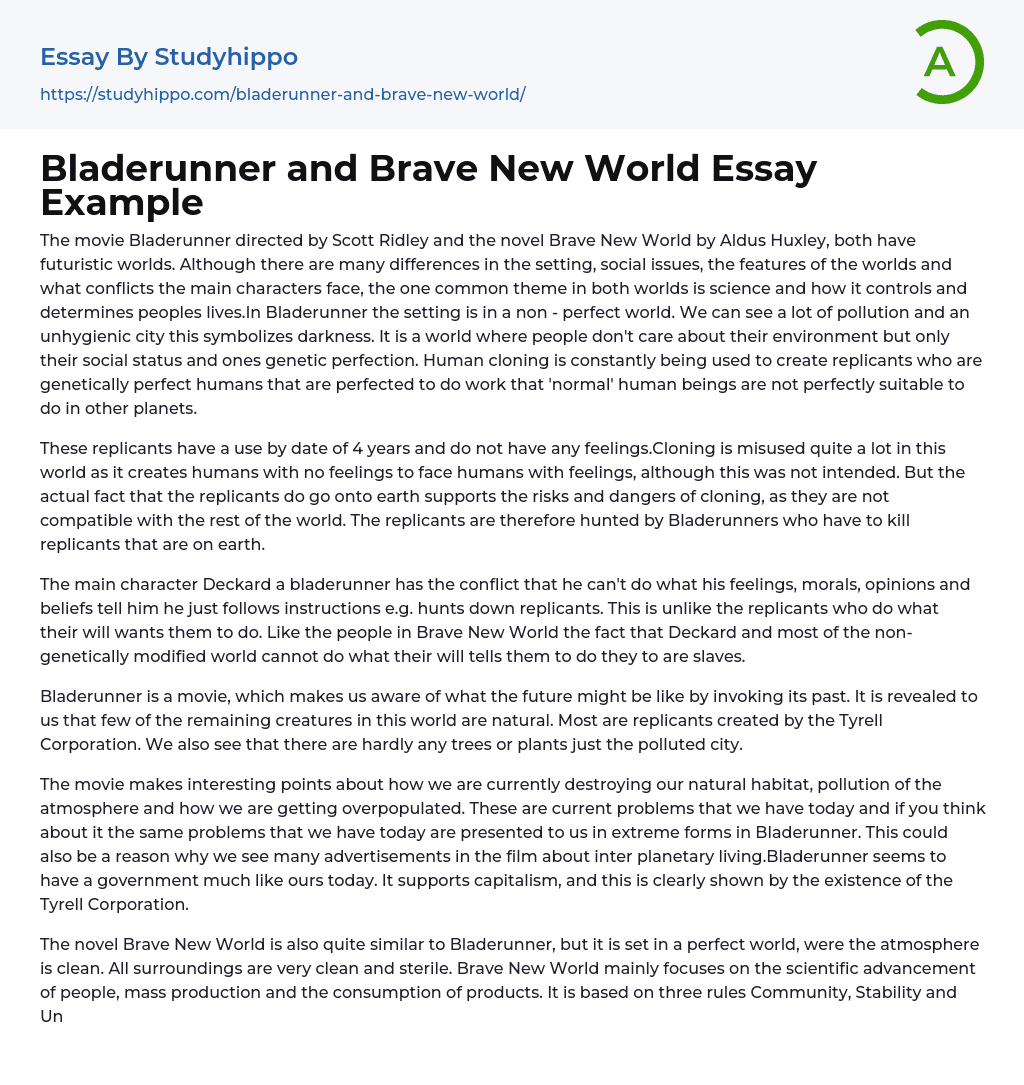Both Bladerunner, directed by Scott Ridley, and Aldus Huxley's novel Brave New World depict futuristic societies where science has a dominant role in shaping people's lives. Despite differences in setting, social issues, world features, and main character conflicts, both works share the common theme of science controlling and determining individuals' existence. In Bladerunner, the dystopian environment reflects an imperfect world where social status and genetic perfection hold more importance than environmental preservation. The creation of replicants through human cloning produces genetically ideal workers capable of performing tasks that regular humans cannot undertake on other planets.
Cloning is often misapplied, producing emotionless human clones that must interact with emotionally capable individuals, an unintended consequence. Replicants are a prime example of this as they possess a limited lifespan of only four years and em
...otions are absent from their makeup. Nonetheless, Replicants' existence on Earth accentuates the hazards and perils associated with cloning since they cannot coexist harmoniously with humans, necessitating Bladerunners to track them down and extinguish them.
Deckard, the protagonist in the movie Bladerunner, faces a dilemma - he follows orders, such as hunting replicants, and ignores his own emotions, morality, opinions, and beliefs. Uniquely, replicants do not face this conflict and can act on their desires. This scenario is similar to the book Brave New World, where individuals lack free will and are hence considered as slaves. Similarly, Deckard and the non-genetically modified population lack free will and are also slaves.
The movie Bladerunner uses the past to give us a glimpse into the potential future. It shows us that the majority of creatures in this world are replicants made by the Tyrell Corporation, with only a few
being natural beings. Additionally, the city is heavily polluted, with barely any trees or plants present.
The movie highlights how our natural habitat is being destroyed, the atmosphere is polluted and overpopulation is becoming an issue. These are current problems that we face today, and they are portrayed in an extreme form in Bladerunner. This could explain why there are many advertisements about interplanetary living in the film. Similar to our government, Bladerunner's government also supports capitalism, as evidenced by the presence of the Tyrell Corporation.
The book Brave New World and Bladerunner share similarities, but the former is set in a pristine world that boasts clean surroundings and atmosphere. The novel primarily explores scientific progress, mass production, and mass consumption. Key themes in the work are Community, Stability, and Unity. The story features 'Ford' as the primary figure who was the first invention to receive global mass production.
In Brave New World, a non-capitalistic society is controlled by natural selection that separates people into social classes. A one-world government strips people of their freedom, and unlike Bladerunner, society not only lives under a totalitarian government but also embraces it like mindless robots. Instead of guns, Soma is the preferred weapon for the world leaders to control their people with, as they realized that fear and intimidation build up resentment in the minds of the people and have limited power.
There seem to be no negative consequences associated with subliminal seduction, Boskonskification, sleep treatment, and cloning when used together to treat people's problems. These tactics have effectively wiped out issues in society prior to Ford. The protagonist Bernard experiences inner turmoil throughout the book as he is
torn between residing in the World State and the Savage Reservation. Bernard's society conditions him to conform, but he longs for freedom which he sees in John the Savage. Bernard envies John's sense of contentment, which is forbidden in Bernard's society. In this novel, Bernard exemplifies the struggle between slavery and freedom.
The author of this novel suggests that genuine freedom can only be attained by enduring difficulty and discomfort, as those who do not experience suffering lack a true sense of spirit. Unlike Blade Runner, the setting portrayed in Huxley's work lacks any passion or hardship. As for the topic of human cloning, I believe it should be prohibited both presently and in the future within our society. My Christian faith leads me to firmly believe that humanity's destiny ought to remain under God's control.
- 12 Angry Men essays
- A beautiful mind essays
- A Separation essays
- Alfred Hitchcock essays
- American Beauty essays
- American Films essays
- Animation essays
- Avatar essays
- Blade Runner essays
- Bollywood essays
- Bond essays
- Bridge essays
- Cinema Of The United States essays
- Comedies essays
- David essays
- Dead Poets Society essays
- Do The Right Thing essays
- Documentary essays
- English-Language Films essays
- Erin Brockovich essays
- Film Analysis essays
- Film Editing essays
- Film Noir essays
- Film Techniques essays
- Finding Forrester essays
- Forrest Gump essays
- Gattaca essays
- Gladiator essays
- Glory essays
- Good Will Hunting essays
- Hamilton essays
- Hollywood essays
- Horror essays
- Jaws essays
- King kong essays
- Like Water For Chocolate essays
- Looking For Alibrandi essays
- Martin Scorsese essays
- Melodrama essays
- Monster essays
- Moulin rouge essays
- Movie Analysis essays
- Movie Review essays
- On The Waterfront essays
- One Flew Over The Cuckoo'S Nest essays
- Our day out essays
- Pearl Harbor (Movie) essays
- Persepolis essays
- Pornography essays
- Rabbit Proof Fence essays




